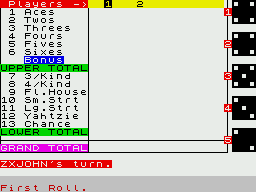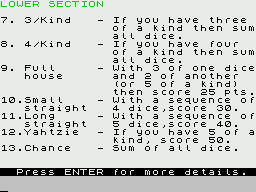Retro Replay Review
Gameplay
Yahtzie delivers an authentic digital translation of the classic five-dice strategy game, faithfully replicating the rules and pacing that fans have come to love. At its core, the gameplay revolves around rolling five dice up to three times per turn, then assigning the result to one of thirteen scoring categories on your scorecard. Before committing, the game displays your potential points for each category, allowing you to make informed strategic decisions. This “preview” feature is particularly welcome for newcomers who may not yet be familiar with the optimal choices for upper- and lower-section scoring.
(HEY YOU!! We hope you enjoy! We try not to run ads. So basically, this is a very expensive hobby running this site. Please consider joining us for updates, forums, and more. Network w/ us to make some cash or friends while retro gaming, and you can win some free retro games for posting. Okay, carry on 👍)
Supporting up to four players—whether human or CPU—Yahtzie offers both solo and multiplayer modes. The CPU opponents adjust their tactics based on difficulty level, providing a reasonable challenge for those looking to hone their skills alone. In local multiplayer, turns pass quickly, and the interface clearly highlights which player is active and which dice are locked or being re-rolled. The ability to mix human and CPU players ensures that you never have to wait for a full group to start a game, making it ideal for on-the-fly sessions.
Command inputs are streamlined but require a brief learning curve. Rolling specific dice is done via commands like R235 to reroll the second, third, and fifth dice, while scoring is selected with S2 or S11 for the twos or large straight category, respectively. Though this shorthand feels a bit archaic compared to modern point-and-click menus, it actually speeds up seasoned players’ turns. Overall, the gameplay loop is easy to pick up yet rich enough to keep even veteran Yahtzee enthusiasts engaged through multiple rounds.
Graphics
Visually, Yahtzie opts for function over flair. Dice are rendered as simple white cubes with black pips, stacked vertically on the right side of the screen. On the left sits a monochrome scorecard, clearly displaying each player’s running totals. While there’s no attempt at realistic 3D shading or flashy particle effects, the minimalistic design ensures that you’re never confused about the values showing up on your dice or your current score.
The color palette is restrained—predominantly grayscale with occasional highlights to indicate active selections. This restrained aesthetic may feel dated to players accustomed to vibrant UI themes, but it also lends the game a timeless clarity. There’s zero clutter, and each screen element serves a precise purpose. If you prize legibility and a clean layout over bells and whistles, you’ll appreciate the straightforward approach Yahtzie takes.
Animations are kept to a minimum: dice roll into place and briefly flash when you finalize a reroll, then settle instantly. There’s no background music beyond simple beeps and clicks, which some might find too austere. However, the sound design does convey each action’s completion crisply, leaving you free to supply your own soundtrack or play in silence. Overall, the graphics and audio combine to form a no-nonsense package that puts gameplay front and center.
Story
As a pure digital rendition of a tabletop game, Yahtzie doesn’t offer a narrative campaign or characters. There is no lore about dice deities or grand tournaments—just you, your opponents, and the luck of the roll. For some, this stripped-down presentation will feel refreshingly direct; for others seeking story-driven progression, the lack of plot elements might be disappointing.
Despite the absence of a traditional story, Yahtzie still evokes a sense of competition and camaraderie. Each match unfolds like a mini-tournament, complete with tension as players vie for the top score. The game’s structure encourages player-to-player interaction through banter and friendly rivalries, replicating the social experience of gathering around a kitchen table. In that sense, the “story” of Yahtzie is written by the players each time they roll.
If you’re hoping for narrative hooks or unlockable characters, you won’t find them here. Instead, the game leans on the enduring appeal of the original dice mechanics to keep you engaged. The satisfaction comes from outwitting the CPU, setting new personal bests, or besting friends in a tight contest—an experience that has persisted for decades and remains central to Yahtzee’s charm.
Overall Experience
Yahtzie succeeds as a faithful digital edition of a beloved classic, delivering exactly what fans expect: clean rules implementation, customizable multiplayer, and straightforward controls. The lack of modern embellishments may deter players who crave flashy interfaces or story-driven modes, but it also means there are no unnecessary distractions from the core dice-rolling strategy. If you appreciate games in their purest form, Yahtzie will feel like a breath of fresh air.
Replayability is high thanks to the variable outcomes each roll produces, and the inclusion of CPU opponents ensures you can enjoy a game even when friends aren’t available. Sessions can be as brief or as lengthy as you like, making Yahtzie suitable for quick breaks or extended evenings of strategic play. The command-based input system takes a moment to master but ultimately speeds up gameplay, a boon for those seeking efficient turnarounds.
For buyers on the fence, consider what you value most: if you want a no-frills, authentic Yahtzee experience that you can pick up and play immediately, Yahtzie hits the mark. The minimalist presentation underscores the timeless appeal of the dice-and-scorecard format, ensuring that gameplay remains the star of the show. Whether you’re a longtime Yahtzee devotee or a newcomer eager to explore a classic, Yahtzie offers a reliable, engaging experience that honors the spirit of the original tabletop game.
 Retro Replay Retro Replay gaming reviews, news, emulation, geek stuff and more!
Retro Replay Retro Replay gaming reviews, news, emulation, geek stuff and more!








Reviews
There are no reviews yet.